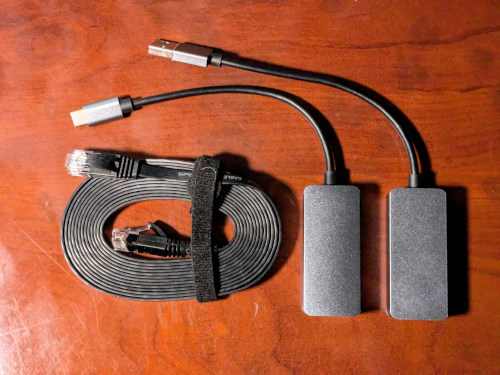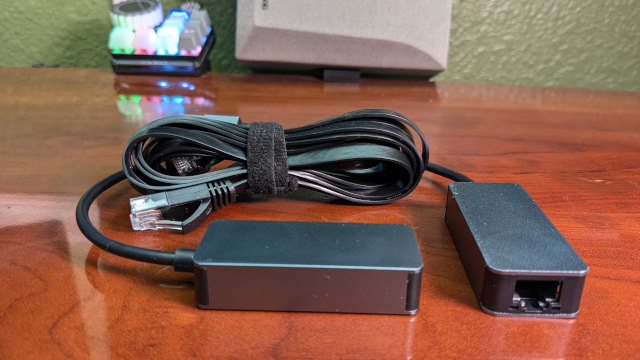I very nearly typed “so you don’t have to” as the end of this blog post’s title, but that wouldn’t be the least bit accurate! I bought these because I posted a link to a deal for a Sabrent 2.5-gigabit USB Ethernet adapter for $20 on our Discord server, and someone piped up and said they buy theirs from Aliexpress because the cheap ones over there use the same Realtek R8169 Ethernet chip. I fully expected these inexpensive network dongles to work great!
I now have two mini PCs in my homelab with 2.5-gigabit Ethernet ports, so it feels like it is going to be time to start ordering some 2.5-gigabit switches. I figured I could order a couple of 2.5-gigabit dongles to upgrade some other machines around the house, and I could also use those dongles to make sure that the Cat 5e cable that Brian and I pulled through this house a decade ago is up to the task of pushing faster speeds from my homelab on the opposite side of the house to my home office!

I also don’t know that I literally chose the cheapest dongles on Aliexpress. Some cost more but had free shipping. Others never had free shipping. Some vendors had free shipping over $10. I figured that last one would be where I’d get a deal, so I bought a USB-A and USB-C dongle from the same store for a total of about $14 for the pair.
Oddly enough, these are the most premium-feeling USB network adapters I have ever owned. My 1-gigabit Ethernet dongle in my laptop bag is all plastic and weighs 20 grams. These new dongles are in an aluminum shell, and they weigh over 30 grams each!
- My Networking and NanoKVM Pouch For My Laptop Bag
- 2.5-Gigabit Ethernet USB dongle at Aliexpress
- Sabrent USB-C 2.5-gigabit Ethernet dongle at Amazon
Why am I excited about USB network adapters? Aren’t PCIe cards better?!
The best bang for the buck in mini PC gear for your homelab cluster will have DDR4 memory and almost always have 1-gigabit Ethernet ports. Part of the reason the older DDR4 mini PCs are such a good value is because large DDR5 SO-DIMMs cost 40% more. That isn’t a big difference if you’re only buying one mini PC or if you aren’t maxing out the RAM, but it can add up to a sizable amount of cash if you’re building a small cluster.
Not only that, but some of us already have mini PCs in our homelab that only have gigabit Ethernet. These $7 dongles are a fantastic way to turbocharge our older mini PCs, and they are such an inexpensive way to add 2.5-gigabit Ethernet without paying an extra $80 to $120 for a more expensive mini PC.
I now have two mini PCs in my homelab with built-in 2.5gbe ports. The third Celeron N100 mini PC in my cluster only has 1gbe. I will definitely be adding one of these $7 dongles to that $143 mini PC once I get around to upgrading my network cupboard to 2.5-gigabit Ethernet!
The cheap 2.5-gigabit dongles passed their first test without any hiccups!
I plugged the USB-A dongle into my workstation, then I plugged the USB-C dongle into my Minisforum UM350 mini PC, and I connected them up with one of my new 10’ flat-pack Cat 6 cables.
I have been a fan of flat Ethernet cables for many years, but I haven’t bought any in ages, and I needed a reasonably long cable for my network toolkit. The cables I decided to try were excited to tell me that they were Cat 6 cables at Cat 5e prices, so I was a little skeptical. Seeing them move data via iperf at 2.36 gigabits per second made me feel better about my purchase!

There isn’t much to say. The kernel modules automatically loaded on both my Ubuntu workstation and my Proxmox mini PC. Pings were fast, and throughput was right where it should be.
I would call that a successful first test.
How about testing the Cat 5e in my walls?!
Brian and I ran Cat 5e to every room in this house about five years before I moved in. I bet Brian wrote down which ports on the patch panel lead to each room, but I don’t have that document. I was smart enough to make a note of some of the important ports when I was setting things up, so I knew that my office was on port 13 on the 48-port patch panel.
I plugged one of the 2.5-gigabit USB dongles into my laptop and connected my laptop directly to the RJ-45 jack on my office’s wall using one of those 10’ flat-pack Cat 6 cables.
Then I walked across the house with a second 10’ flat-pack cable and plugged one of the extra 2.5-gigabit Ethernet ports on my router-style mini PC Proxmox server into port 13 on the patch panel.
I configured each of those network interfaces with new IP addresses on an unused subnet, and then I ran my usual iperf tests. I am not surprised to report that I was 2.36 gigabits per second in both directions. Huzzah!
It was nice to see my Realtek R8169 USB adapter communicating with an Intel i226-V chipset, and it was also great to see that adding a second inexpensive 10’ flat-pack cable to the connection didn’t degrade my signal.
- It Is My Network Cupboard Now!
- My Asus Vivobook 14 Flip 2-in-1 Laptop and Linux
- My Network Cupboard: The Dramatic Conclusion at Brian’s Blog
Will the cheap 2.5-gigabit Ethernet adapters be stable over the long term?
I put both 2.5-gigabit adapters away after my tests were completed. That is kind of a bummer because I definitely want to make sure they continue to work for weeks, months, and years.
I am pondering which Mokerlink 2.5-gigabit switches I need to buy, and I don’t have much use for extra 2.5-gigabit network interfaces until I order and install a new switch in both my network cupboard and my home office. That work is at least a few weeks away.
We have several people on our Discord server who have had good luck with their R8169 USB adapters, and Brian Moses tells me he had his homelab server connected with an R8169 USB dongle for a few months. I don’t expect to see any long-term problems once I put these into service, but I will definitely report back with anything I see!
What’s next?
It is a good sign that the cabling in my walls is in good enough shape to run at 2.5 gigabits per second, but the Mokerlink 2.5-gigabit switches I want to put in my network cupboard and home office have 10-gigabit SFP+ ports. I do not have proof that my wiring will get me that far!
The next step is definitely to buy a pair of Mokerlink switches, and I will definitely shop around for 10-gigabit modules that actually support 2.5-gigabit and 5-gigabit Ethernet. My hope is that they will negotiate down if my office can’t support a full 10 gigabit.
Want to follow along on this journey? We’re building a homelab and DIY NAS community on the *Butter, What?! Discord server where we share tips, tricks, and troubleshoot issues. Swing by, join the conversation, and share your homelab setup with us! I’m also curious to hear your thoughts. What kind of network gear are you using in your own setups? Are you using inexpensive USB 2.5-gigabit Ethernet adapters? How are they working out for you? Are you using the Mokerlink switches that I am currently shopping for? Let me know how things are working out for you in the comments below!